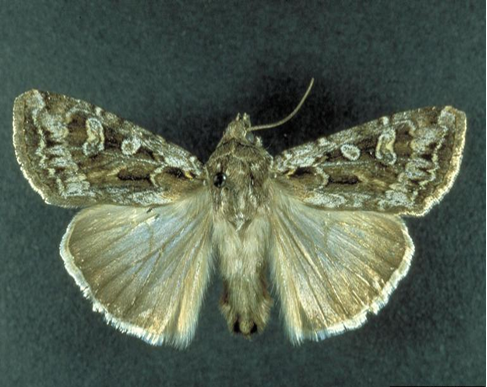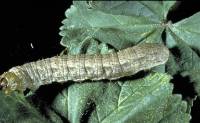Dingy Cutworm

There have been several calls over the last week about a large number of “miller moths” that have been pests around lights and doors or garages. These moths are called Dingy Cutworm moths. This moth is native to the entire United States. They are commonly found in gardens, agricultural fields, and orchards. Adult moths are often hard to distinguish from other cutworm moths as the markings tend to disappear with age. In general, cutworm moths are large and heavy-bodied with light brown to gray markings on the wings. The larvae are heavy-bodied and have various markings similar to the photo below. The moths we see now are overwintered as eggs or larvae in weedy or grassy areas before feeding and hatching as adults in the last few weeks.
Cutworms are general feeders that attack many plants, from beans, cabbage, peppers, potatoes, corn, and sunflowers. Cutworms get their name by curling their bodies around the stem of plants and feeding on the stem. This feeding causes the plant to be cut off just above the soil surface. Adult moths do not damage plants; they are simply pests in households. If you start seeing plants that appear to have been cut off at the soil's surface, I would start looking for the cutworm larvae. If you can find them, they are easy to kill by squishing or dropping them in a bucket of soapy water. You can also exclude cutworms using a collar of aluminum foil or cardboard collars to create a barrier. Place the barriers around the plants so one end is pushed a few inches into the soil and the other extends several inches above the ground. Chemicals may be necessary if there are many cutworms; however, they usually aren't needed.
potatoes, corn, and sunflowers. Cutworms get their name by curling their bodies around the stem of plants and feeding on the stem. This feeding causes the plant to be cut off just above the soil surface. Adult moths do not damage plants; they are simply pests in households. If you start seeing plants that appear to have been cut off at the soil's surface, I would start looking for the cutworm larvae. If you can find them, they are easy to kill by squishing or dropping them in a bucket of soapy water. You can also exclude cutworms using a collar of aluminum foil or cardboard collars to create a barrier. Place the barriers around the plants so one end is pushed a few inches into the soil and the other extends several inches above the ground. Chemicals may be necessary if there are many cutworms; however, they usually aren't needed.

Have questions? Contact our office where our Horticulture Extension Agent will assist you with questions.
Phone: (316) 321-9660
Email: callae@ksu.edu